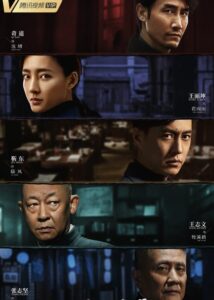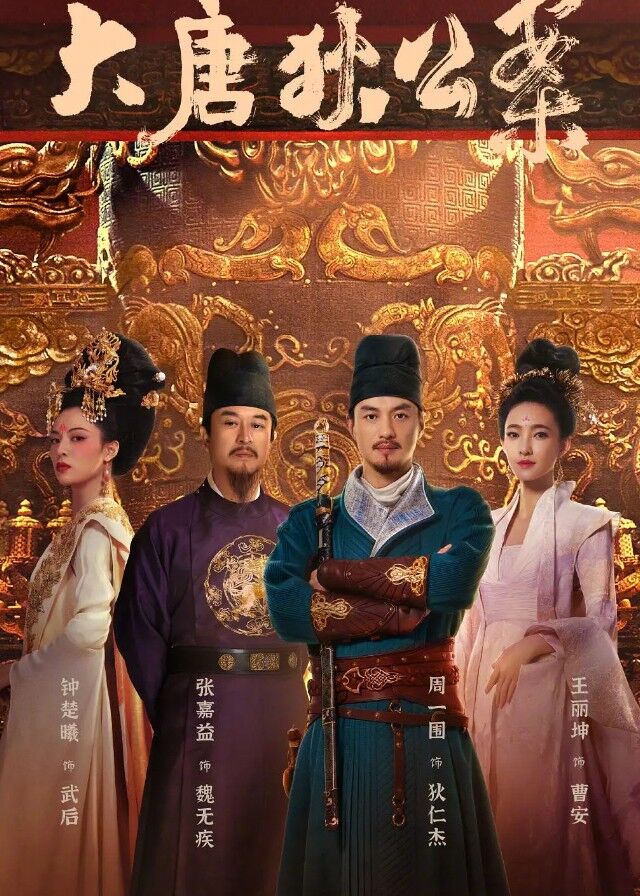Judge Dee's Mystery Episode 3 Recap
> Judge Dee's Mystery Recap
On the fifth day, Di Renjie and the other two disguised themselves as porters and snuck into the archives to look for the list of personnel who had left the capital region nine days prior. Ma Rong couldn't participate because he was illiterate, but Qiao Tai found the register in time and confirmed that the four deceased were from the Imperial Guards.
Just as Di Renjie had suspected, they had been ordered to forge an imperial edict, poisoned and killed Chen Chuliang, and were then silenced. The three split up to search the market for clues related to the badge. A merchant from the Western Regions saw the badge in Di Renjie's hand and immediately recognized it as belonging to Emperor Taizong's Xuanjia Army, the former troops of the rebel general Kang Huaien.
On the other side, Qiao Tai accidentally discovered Kang Zhiyi's dossier that Ma Rong had brought back from the archives, and quickly handed it to Di Renjie, inadvertently finding that Kang Huaien was actually Kang Zhiyi's father. Di Renjie suddenly realized the truth and immediately found Wei Wuji to report the progress of his investigation, believing that both the case at the silkworm shed outside the city and the case at Jushui Building were related to Kang Zhiyi.
That year, when the Xuanjia Army campaigned against the Tuohan Kingdom, Kang Huaien rebelled and defected to the Xueyantuo tribe. This should have been a crime punishable by the extermination of the nine familial relations, but Zhangsun Qing stepped forward to guarantee his safety, and only after the former Emperor's passing was Kang Zhiyi able to return to Chang'an and join the Jinwu Guard, later becoming the Empress's personal guard.
Therefore, Di Renjie connected this to the night of the Jushui Building incident, when Zhangsun Qing secretly met with Kang Zhiyi after booking out a venue in Pingkang Quarter. Combining all the clues, he suspected that Kang Zhiyi had stolen the Phoenix Seal, forged an imperial edict, ordered the Yulin Army, and set the fire to burn the palace maid Yaxin, who was in charge of the seal, to death.
When Wei Wuji learned that Di Renjie was preparing to report to the Ministry of Justice and the Supreme Court and request a joint trial by the Three Judicial Offices to vindicate the Empress, his expression grew increasingly solemn. Wei Wuji pointed out that Di Renjie was only speculating and lacked concrete evidence, making it difficult to file a case.
Furthermore, Zhangsun Qing had already jointly memorialized the Sage along with Situ Xu Yuan and Left Paladin Sun Zhining, making the matter of deposing the Empress likely unavoidable. Although the Empress also had officials who vigorously defended her, Zhangsun Qing held a high position and great power. As the leader of the Great Tang's meritorious noble families, the majority of the anti-Wu faction obeyed his every command.
He was like a massive tree, casting a shadow over the entire Chang'an City, and no one could easily shake him. Although Di Renjie believed that if Zhangsun Qing threatened the officials in court and commoners, it could also endanger the Sage's authority, and that someone whose achievements overshadowed the ruler would inevitably face backlash, he was currently uncertain about bringing down the other party and might even implicate Ma Rong and Qiao Tai.
Di Renjie stood in the pavilion, lost in thought. Suddenly hearing a Bingzhou tune, he recalled the scene of his grandfather jumping into the river and dying, realizing that court politics were far more complex than he had imagined. As a result, Di Renjie sought out his two companions to drink and talk, speaking with confusion and saying some inexplicable things.
Hong Liang snatched the wine pot and criticized Di Renjie, saying that more than half of the promised time limit had passed, yet he still had no evidence in hand and wasn't thinking about how to handle the situation. Di Renjie did not respond but instead advised Ma Rong and Qiao Tai to leave Chang'an.
Ma Rong suspected that Di Renjie had gotten into big trouble and thought that leaving Chang'an to observe from the shadows might be the best strategy. In contrast, Hong Liang saw that Di Renjie's thoughts were jumbled and encouraged him to follow his heart to find the answer and go all out. - In the blink of an eye, it was the sixth day.
In order to contend with the Empress, after offering sacrifices to the national cypress, Zhangsun Qing paraded with the cypress to confess his sins, proclaiming that the Empress had provoked heavenly wrath and harmed the people. He declared his resolve to personally donate thirty thousand strings of cash for incense and candles to pray for peace and prosperity in the Great Tang, and his words and actions deeply won over the people.
Di Renjie suddenly appeared and prophesied that the heavenly fire would descend at least five times. The first three times had already burned Wutong trees, performers, and silkworm farmers, and the next time would burn the "Register of Surnames", because it was the Empress's biggest political initiative in recent years. He stated that if the heavenly fire arrived, it would be a natural disaster, and if it didn't, it would be a man-made disaster.
As soon as these words were spoken, the crowd was in an uproar. Di Renjie glanced at Zhangsun Qing and Kang Zhiyi on the second floor, and left with deep meaning. Evidently, by doing this, Di Renjie was risking his life and property, intending to provoke Zhangsun Qing and Kang Zhiyi and force them to walk into a trap. Wei Wuji tacitly approved of Di Renjie's actions and decided to stay and watch the "heavenly fire".
If he could witness the true face of the manipulator of fate, he would have no regrets in this life. However, as Di Renjie and others acted according to the plan, the horses suddenly lost control. The stirrups had been tampered with, making it difficult for him to break free.

















